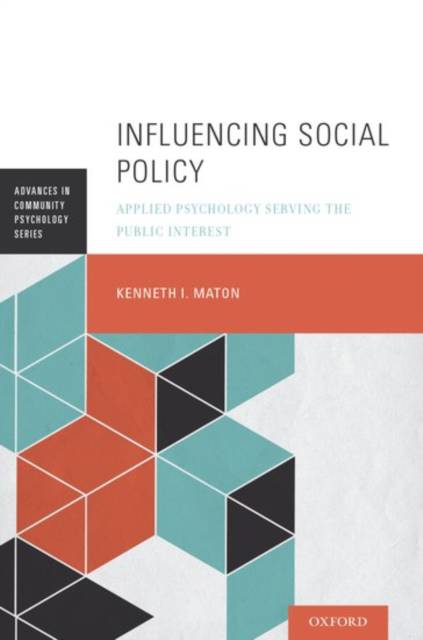
- Afhalen na 1 uur in een winkel met voorraad
- Gratis thuislevering in België vanaf € 30
- Ruim aanbod met 7 miljoen producten
- Afhalen na 1 uur in een winkel met voorraad
- Gratis thuislevering in België vanaf € 30
- Ruim aanbod met 7 miljoen producten
Zoeken
€ 156,45
+ 312 punten
Omschrijving
Influencing Social Policy synthesizes current knowledge about how psychologists influence social policy to serve the public interest. The volume builds upon interviews with 79 applied psychologists about their experiences in the policy domain, with special focus on the work of applied developmental psychologists, applied social psychologists, and community psychologists. Additional foundations of the volume include a review of social science scholarship across a wide range of disciplines, and author Kenneth Maton's 30 years of teaching on the topic, including frequent interactions with Washington, DC, policy experts. Together, these sources provide in-depth information about how applied psychologists influence social policy, the factors that contribute to their success, the challenges they face, and the approaches used to address those challenges. The policy influences described span all three branches of government: legislative, executive, and judicial. The policy content areas are diverse, including the death penalty prohibition for adolescents, early childhood education, gay marriage, gender discrimination in the workplace, health and mental health care reform, homelessness, home visiting programs, sexually abused child witness treatment, status offender diversion from the juvenile justice system, substance abuse prevention, and many others. Influencing Social Policy is a must-have resource for graduate students and professionals in a wide variety of disciplines with interests in influencing social policy, including psychology, education, public health, social work, policy studies, anthropology, and sociology.
Specificaties
Betrokkenen
- Auteur(s):
- Uitgeverij:
Inhoud
- Aantal bladzijden:
- 408
- Taal:
- Engels
- Reeks:
Eigenschappen
- Productcode (EAN):
- 9780199989973
- Verschijningsdatum:
- 16/08/2016
- Uitvoering:
- Paperback
- Formaat:
- Trade paperback (VS)
- Afmetingen:
- 155 mm x 231 mm
- Gewicht:
- 498 g

Alleen bij Standaard Boekhandel
+ 312 punten op je klantenkaart van Standaard Boekhandel
Beoordelingen
We publiceren alleen reviews die voldoen aan de voorwaarden voor reviews. Bekijk onze voorwaarden voor reviews.











